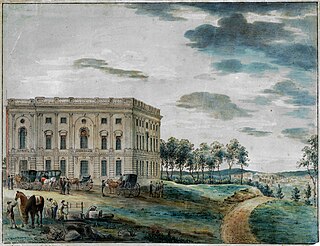
The 7th United States Congress was a meeting of the legislative branch of the United States federal government, consisting of the United States Senate and the United States House of Representatives. It met in Washington, D.C. from March 4, 1801, to March 4, 1803, during the first two years of Thomas Jefferson's presidency. The apportionment of seats in the House of Representatives was based on the First Census of the United States in 1790. Both chambers had a Democratic-Republican majority, except during the Special session of the Senate, when there was a Federalist majority in the Senate.

The 8th United States Congress was a meeting of the legislative branch of the United States federal government, consisting of the United States Senate and the United States House of Representatives. It met in Washington, D.C. from March 4, 1803, to March 4, 1805, during the last two years of the first presidency of U.S. President Thomas Jefferson. The apportionment of seats in the House of Representatives was based on the Second Census of the United States in 1800. Both chambers had a Democratic-Republican majority.

The 1812 and 1813 United States House of Representatives elections were held at various dates in different states between April 1812 and August 1813 as James Madison was re-elected president.
The 1802 and 1803 United States House of Representatives elections were held at various dates in each state, from April 26, 1802 to December 14, 1803 during President Thomas Jefferson's first term in office. It was common in the early years of the United Congress for some states to elect representatives to a Congress after it had already convened. In the case of the 8th Congress, the representatives from New Jersey were only elected after its first meeting on October 17, 1803.

The 1790 and 1791 United States House of Representatives elections, took place in the middle of President George Washington's first term. While formal political parties still did not exist, coalitions of pro-Washington (pro-Administration) representatives and anti-Administration representatives each gained two seats as a result of the addition of new states to the union.
New York's 9th congressional district is a congressional district for the United States House of Representatives in New York City, represented by Yvette Clarke.
The 1802 and 1803 United States Senate elections were elections for the United States Senate which resulted in the Democratic-Republican Party maintaining and expanding their majority of seats.

The 1802 United States House of Representatives elections in New York were held from April 27 to 29, 1802, to elect 17 U.S. Representatives to represent the State of New York in the United States House of Representatives of the 8th United States Congress.

The 1804 United States House of Representatives elections in New York were held from April 24 to 26, 1804, to elect 17 U.S. Representatives to represent the State of New York in the United States House of Representatives of the 9th United States Congress. At the same time, a vacancy was filled in the 8th United States Congress.

The 1816 United States House of Representatives elections in New York were held from April 23 to 25, 1816, to elect 27 U.S. Representatives to represent the State of New York in the United States House of Representatives of the 15th United States Congress. At the same time, a vacancy was filled in the 14th United States Congress.

Georgia gained 2 seats in reapportionment after the 1800 census. Elections were held October 4, 1802.

North Carolina increased its apportionment from 10 to 12 seats after the 1800 census.

South Carolina increased its apportionment from 6 seats to 8 after the 1800 census.

New Hampshire increased its apportionment from 4 seats to 5 after the 1800 census.

A special election was held in North Carolina's 8th congressional district on October 15, 1802 to fill a vacancy left by the death of Charles Johnson (DR) on July 23, 1802.
A special election was held in South Carolina's 4th congressional district on April 12–13, 1802 to fill a vacancy resulting from the resignation of Thomas Sumter (DR) on December 15, 1801, upon being elected to the Senate.

The 1846 United States House of Representatives election in Florida was held on Monday, October 5, 1846 to elect the single United States Representative from the state of Florida, one from the state's single at-large congressional district, to represent Florida in the 30th Congress. The election coincided with the elections of other offices, including various state and local elections. The party primaries were held on June 20, 1846.
The 1802 United States elections occurred in the middle of Democratic-Republican President Thomas Jefferson's first term, during the First Party System. Members of the 8th United States Congress were chosen in this election. Democratic-Republicans picked up several seats in both chambers of Congress, solidifying their control over the House and Senate.

A special election was held in Georgia's at-large congressional district on December 15, 1802 to fill a vacancy caused by the resignation of John Milledge (DR), who had been elected Governor of Georgia. The winner would only finish the term ending March 3, 1803. A separate election would also be held in October 1803 to fill the seat for the next term.